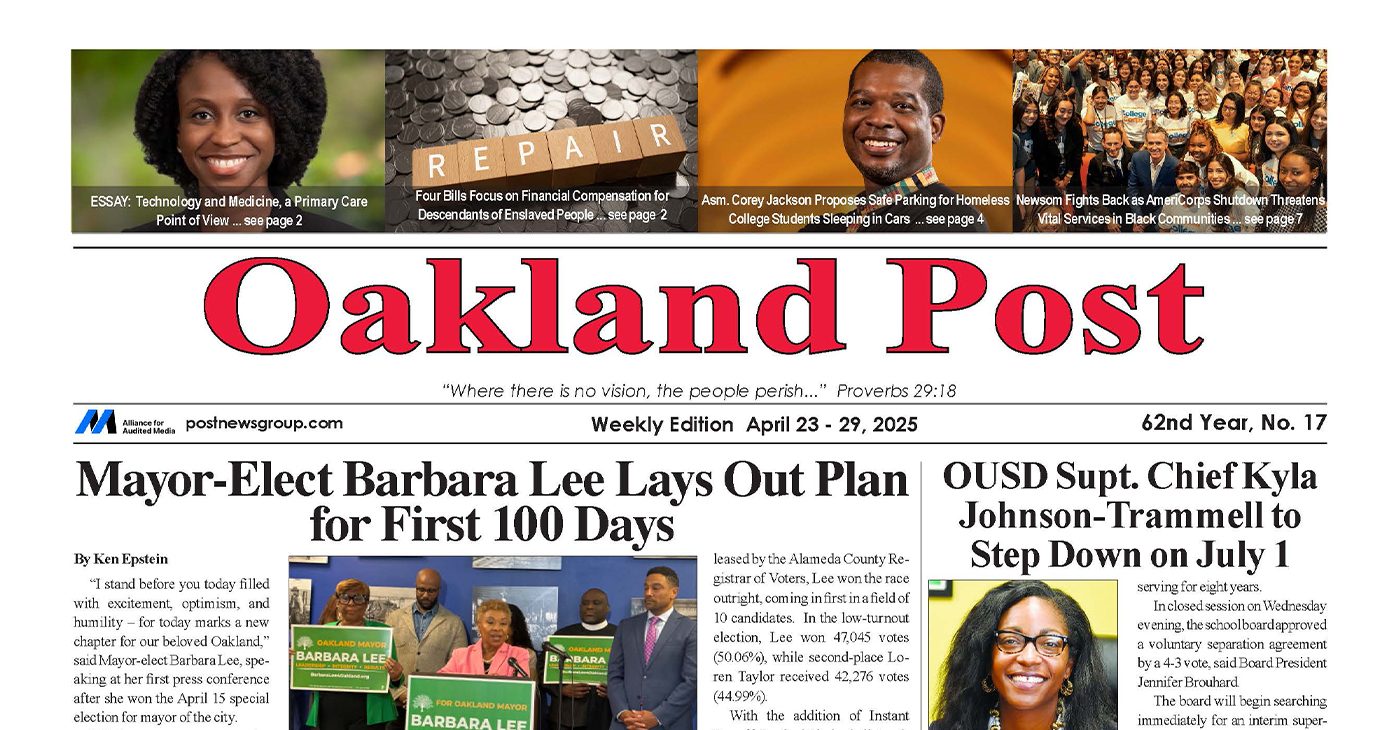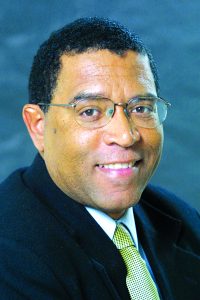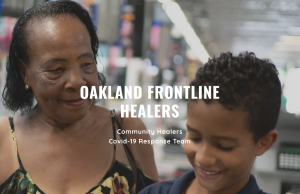Entertainment
“The Jemima Code: Two Centuries of African American Cookbooks” Book Review
You woke up this morning with a craving.
So is breakfast time too early to think about dinner? Is it bad to want to sneak home for lunch, just to make your favorite comfort food? No, because nothing else tastes good when you’re hankering for something specific.
<p>
Your stomach won’t give up until you’ve satisfied that craving, so you might as well give in a little and read “The Jemima Code” by Toni Tipton-Martin.
Though her upbringing in California was sprinkled with foods reminiscent of her family’s origins in the South, Toni Tipton-Martin says that “precious few” of her favorite foods “qualified as southern.”
That made her, she says, “a casualty of the Jemima code,” which she defines as something that classifies the “character and life’s work of our nation’s black cooks as insignificant.”
She set out to change that.
In many libraries, cookbooks by African American authors are lacking. “Even,” says Tipton-Martin, “the southern cookbooks were silent on the subject” so she began to specifically collect cookbooks written by black authors, containing the knowledge and recipes of black cooks.
As her collection grew, so did her understanding and she began seeing how “cooking changed, and cooks changed with it.”
From an obscure 1827 cookbook – the first one published by an African American author (and a man!) – Tipton-Martin realized that many black cooks “existed in the culinary shadows as far as cookbook writers were concerned.”
Much of their work was probably credited to white owners or employers.
Technological advances in the early twentieth century altered how meals were made; science entered the picture, too, as did household worker’s unions – the latter, to the frustration of white employers, which is something African American cookbooks quietly reflected.
By mid-century, the early Civil Rights Movement could be spotted in black cookbooks of the day. Soul Food enjoyed new appreciation in the 1960s from hippies, flower children, “feisty black cooks,” and people of all races.
By the 1980s, African American cookbooks were penned by football stars, gardeners, and experts alike. Says Tipton-Martin, “it was the cooks’ time to shine” although, even in today’s kitchen, “the times are not yet postracial.”
There are, as I see it, three main reasons why you’d want “The Jemima Code” on your kitchen bookshelf.
First, author Toni Tipton-Martin’s history is a surprising one. Reading her discoveries of cookbook subtleties and social mores alongside recipes through the years feels like opening a multi-layered gift, and her evolution of the Mammy figure is also fascinating.
And those recipes she found? Though there aren’t a lot of them here, the ones that peek out through the pages are classic and easy to follow.
And finally, there’s a treasure-trove of pictures inside, of cooks at work and of the cookbook covers themselves, making this large-sized book one that readers will want to carry with them from kitchen to living room, countertop to easy chair.
You’ll scarcely know what to look at first, or what to cook next, making “The Jemima Code” a book you will crave.
“The Jemima Code: Two Centuries of African American Cookbooks” by Toni Tipton-Martin, c. 2015, University of Texas Press, $45.00; 246 pages.
Activism
S.F. Businesswomen Honor Trailblazers at 44th Annual Sojourner Truth Awards and Scholarship Luncheon
This year’s well-deserved award recipients were women who graciously and continuously have served and empowered the Bayview community and beyond.

By Rev. Dr. Rochelle Frazier
Special to The Post
On Saturday, April 19, the San Francisco Business and Professional Women’s Club (SFBPWC) held its sold-out 44th Annual Sojourner Truth Awards and Scholarship Luncheon at the Southeast Community Center at 1550 Evans Ave. in San Francisco.
The luncheon’s theme was “Moving Forward with a Purpose: From Trailblazers to Game Changers.”
This year’s well-deserved award recipients were women who graciously and continuously have served and empowered the Bayview community and beyond.
Carol Evora Tatum received the National Sojourner Truth Meritorious Service Award for her decades of leadership and dedicated community service.
Brittany Doyle, founder and CEO of WISE Health SF, was honored as the Businesswoman of the Year because of her insightful and innovative business acumen regarding community-centered health programs.
La Shon A. Walker was recognized as the Professional Woman of the Year for her community empowerment and leadership work as the vice president of Community Affairs at FivePoint.
The luncheon also provides an opportunity to present scholarships to well-deserving students. The scholarship awardees were Jayana Harbor and Zari Moore, both graduating from Immaculate Conception Academy, and London Robinson, who is graduating from Raoul Wallenberg Traditional High School.
Harbor plans to attend Morgan State University in Baltimore, Maryland; Moore will attend Loyola University in New Orleans, and Robinson will attend Southern University and A&M College in Baton Rouge, Louisiana.
“The 44th Annual Sojourner Truth Awards and Scholarship Luncheon is more than a celebration,” said Cheryl Smith, president of SFBPWC. “It’s a tribute to the legacy of Black women who have paved the way and made a commitment to uplifting future generations. We are proud to honor extraordinary leaders in our community and invest in the bright minds who will carry us into the future.”
Activism
In 30 Years, Supporters of Swim A Mile | Move A Mile for Women with Cancer Raised $8 Million
Over the last 30 years, participants have raised over $8 million and moved more than 14,000 miles—the equivalent of crossing the United States more than five times. All in support of WCRC’s free cancer services in Alameda and Contra Costa counties.

By Kate Eaneman
Special to The Post
When staff at the Women’s Cancer Resource Center started a fundraiser in 1995, they weren’t trying to create a high-profile event. They just wanted something meaningful: something that could bring people together to raise funds for East Bay women facing cancer.
They called it the Swim A Mile for Women with Cancer. There were no rankings, no competition, no stopwatch at the end of the lane. Just people swimming a mile at their own pace, in honor or memory of someone they cared about, and raising what they could to support WCRC’s work.
In the years since, the event has shifted and stretched. It’s been held at several pools across the East Bay, including Holy Names and its current home at Northeastern University in Oakland, formerly Mills College. For a few years, a second swim was held in Marin.
And in 2020, the event changed again — this time, out of necessity. With the pandemic forcing large gatherings to stop. It also meant, however, that opportunities were opened. People were invited to swim, walk, or move a mile however and wherever they could. That year, the event became the Swim A Mile | Move A Mile for Women with Cancer, and the name has stuck.
Some participants now ‘move their mile’ from neighborhood parks or home treadmills. Others return to the pool each spring. Whichever they take part, everyone fundraises. That money makes up more than a quarter of WCRC’s annual budget.
Over the last 30 years, participants have raised over $8 million and moved more than 14,000 miles—the equivalent of crossing the United States more than five times. All in support of WCRC’s free cancer services in Alameda and Contra Costa counties.
WCRC was founded in 1986 to serve people facing cancer who were often left out of traditional systems of care. Most clients today are low-income, and the majority are women of color over the age of 50.
The organization provides free therapy, support groups, wellness classes, and patient navigation, all rooted in cultural humility and community connection.
What has kept the event going isn’t marketing or corporate backing. It’s people, many of whom come back year after year. Some swim to honor a friend or family member. Others move in memory of someone they lost. For some, it’s a tradition that’s lasted across generations.
Janet started participating in 1997. At the time, she swam with her children. Now, her grandchildren take part, too. “Yes—it’s my very loving and supportive family,” she said.
She continues to participate each year because she believes in the work. “Raising money to support the services offered by the WCRC keeps me feeling good.” When asked what has stayed with her over the years, she answered simply: “Resiliency and community.”
That’s what Swim A Mile | Move A Mile has represented for 30 years. Not a race. Not a performance. Just people moving together for something that matters.
The 30th annual Swim A Mile | Move A Mile for Women with Cancer will be held May 3–4 at Northeastern University in Oakland (formerly Mills College).
To register, volunteer, or learn more, visit: wcrc.org/swim.
Activism
Oakland Post: Week of April 23 – 29, 2025
The printed Weekly Edition of the Oakland Post: Week of April 23 – 29, 2025

To enlarge your view of this issue, use the slider, magnifying glass icon or full page icon in the lower right corner of the browser window.
-

 Activism4 weeks ago
Activism4 weeks agoOakland Post Endorses Barbara Lee
-

 Activism3 weeks ago
Activism3 weeks agoOakland Post: Week of April 2 – 8, 2025
-

 #NNPA BlackPress3 weeks ago
#NNPA BlackPress3 weeks agoTrump Profits, Black America Pays the Price
-

 Activism2 weeks ago
Activism2 weeks agoOakland Post: Week of April 9 – 15, 2025
-

 #NNPA BlackPress3 weeks ago
#NNPA BlackPress3 weeks agoHarriet Tubman Scrubbed; DEI Dismantled
-

 #NNPA BlackPress3 weeks ago
#NNPA BlackPress3 weeks agoTrump Targets a Slavery Removal from the National Museum of African-American History and Culture
-

 #NNPA BlackPress3 weeks ago
#NNPA BlackPress3 weeks agoLawmakers Greenlight Reparations Study for Descendants of Enslaved Marylanders
-

 #NNPA BlackPress3 weeks ago
#NNPA BlackPress3 weeks agoNew York Stands Firm Against Trump Administration’s Order to Abandon Diversity in Schools















































